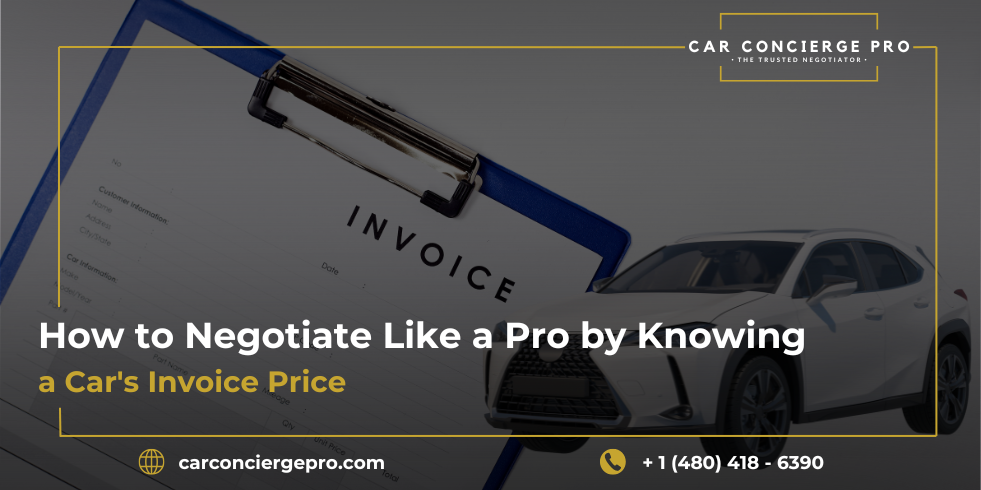Buying a car is one of the most significant financial decisions many individuals make, and negotiation plays a pivotal role in securing the best deal. By understanding a car’s invoice price, you can equip yourself with insider knowledge that empowers you to negotiate effectively. Here, we dive deep into the strategies and techniques that will make you a pro negotiator in the automotive market.
Table of Contents
ToggleWhat is a Car's Invoice Price?
The invoice price is the amount the dealer pays the manufacturer for a vehicle. It functions as the initial cost prior to the application of any dealer markups, incentives, or rebates. Knowing this figure gives you a strong foundation to begin negotiations, as it reveals the dealer’s potential profit margin.
Invoice Price vs. MSRP
- MSRP (Manufacturer’s Suggested Retail Price): This is the price the manufacturer recommends the dealer charge customers. It is usually higher than the invoice price.
- Invoice Price: The cost incurred by the dealer, often lower due to various incentives and holdbacks provided by the manufacturer.
By focusing on the invoice price, you can aim to close the gap between what the dealer pays and what you pay, ensuring significant savings.
Why Knowing the Invoice Price Matters
1. Leverage in Negotiation
Understanding the invoice price allows you to approach the discussion from a position of strength. Dealers often anticipate that buyers will concentrate on the MSRP, but bringing up the invoice price demonstrates your thorough research.
2. Identifying Dealer Incentives
Dealers may receive incentives such as rebates, volume bonuses, or holdbacks from manufacturers. By knowing the invoice price, you can estimate the dealer’s true cost and negotiate below the MSRP.
How to Find a Car's Invoice Price
1. Research Online Tools
Websites like Kelley Blue Book, Edmunds, and Consumer Reports provide reliable estimates of invoice prices for most car models. Use these platforms to gather data before visiting the dealership.
2. Request the Invoice Price
While dealers are not obligated to share invoice prices, some are willing to provide this information if asked directly. Be polite yet firm in your request.
3. Use Car Buying Services
Car buying services and concierge services often have access to invoice prices and can provide this data to help you negotiate.
Tips for Negotiating Like a Pro
1. Start Below the Invoice Price
Dealers typically receive holdbacks or bonuses that make selling below invoice price feasible. Start your offer slightly below the invoice price to leave room for negotiation.
2. Avoid Mentioning Monthly Payments
Focus on the total price rather than monthly payments. Dealers may manipulate financing terms to appear favorable while inflating the overall cost.
3. Be Prepared to Walk Away
Confidence is key. If the dealer refuses to meet your target price, be ready to leave. This approach often prompts dealers to reconsider and make a better offer.
4. Use Competing Offers
Visit multiple dealerships or request quotes online. Sharing lower offers from competitors can pressure dealers into matching or beating those prices.
5. Time Your Purchase Strategically
End-of-month or end-of-quarter sales periods often come with extra incentives for dealers to meet quotas. This timing can work to your advantage.
Common Pitfalls to Avoid
1. Overlooking Additional Fees
Dealers may add fees such as documentation fees, destination charges, or dealer prep fees. Always review the final breakdown to ensure there are no hidden costs.
2. Falling for “Dealer Invoice” Claims
Some dealers may present inflated invoice prices. Cross-check with reliable online tools to ensure accuracy.
3. Skipping Pre-Approval
Securing pre-approved financing gives you a clear idea of your budget and prevents dealers from exploiting financing terms.
Negotiating for New vs. Used Cars
New Cars
Focus on invoice prices, factory incentives, and dealer promotions. With new vehicles, there’s more transparency about costs.
Used Cars
For used cars, focus on market value and condition rather than invoice price. Tools like Carfax or AutoCheck can help verify the car’s history.
The Role of Car Concierge Services
Navigating the complexities of car buying can be overwhelming. Car concierge services like CarConciergePro simplify the process by providing expert assistance in negotiating deals. They leverage industry knowledge and access to invoice prices to secure the best possible price for you.




 and Canada
and Canada 





